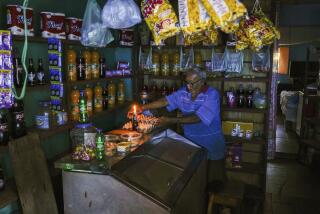Chavez comment hammers stock
- Share via
BOGOTA, COLOMBIA — Shares in Venezuela’s largest telephone company plunged Monday after President Hugo Chavez said the government would take control of it before compensating private owners, including Verizon Communications Inc., for the hundreds of millions of dollars they have invested in the enterprise.
Chavez announced this month that his government would nationalize Compania Anonima Nacional Telefonos de Venezuela, or CANTV, and Electricidad de Caracas, the Venezuelan capital’s largest power provider, which is controlled by AES Corp. of Virginia.
It was unclear from Chavez’s statement, made during “Alo Presidente” (“Hello President”), his Sunday-afternoon television talk show, whether the takeover would happen before or after the expiration in May of the license held by its owners.
The management of CANTV, which was privatized in 1991, says it has not been served with official notice of a takeover.
“We’re going to take it over first and pay later,” Chavez told viewers Sunday. “We will pay what the law says and when the government decides.”
Shares of the company fell 11% on Monday on the Caracas Stock Exchange.
New York-based Verizon, which owns 28.5% of CANTV, had agreed to sell its interest in the utility to Mexican billionaire Carlos Slim Helu for $667 million in a deal announced in 2005. The status of that sale remained unclear.
“We have been anticipating that the government would begin to define the process that they are going to follow in nationalizing CANTV,” Verizon spokesman Alberto Canal said Monday in New York. “That process hasn’t been fully defined.”
Chavez also announced this month that the government would assume control of four major oil projects in eastern Venezuela. ConocoPhillips, Exxon Mobil Corp. and Chevron Corp. of the United States, Total of France and Statoil of Norway have invested billions in the so-called heavy-oil projects.
The president also announced Sunday that he would raise the price of gasoline, which is heavily subsidized, from 18 cents a gallon, but he did not say when or by how much.
The gasoline price hike would be the first since 1997; in his successful presidential campaign in 1998, Chavez promised not to raise gasoline prices.
Chavez also said he would seek to raise taxes to finance economic development projects directed by community councils. The grass-roots governing bodies, which work hand in hand with a new generation of worker-owned cooperatives, are a key element in his “socialism for the 21st century.”
Chavez is transferring ownership of thousands of state-owned assets -- as diverse as steel factories, repossessed hotels and toll roads -- to the cooperatives.
His announcements came as falling crude oil prices could be cramping lavish public spending programs designed to redistribute the nation’s energy wealth to benefit the poor.
In addition to spending hundreds of millions of dollars for subsidized retail goods through the Mercal retail chain and capitalizing the worker-owned cooperatives, Chavez has promised to build or help build five foreign refineries, costing billions each.
The tax increases would apply to wealthy individuals, banks, property owners and companies. Luxury taxes would be applied to second homes, yachts, airplanes and artwork.
*
Times special correspondent Mery Mogollon contributed to this report.
More to Read
Sign up for Essential California
The most important California stories and recommendations in your inbox every morning.
You may occasionally receive promotional content from the Los Angeles Times.













